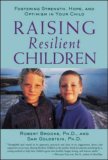Summary | Excerpt | Reviews | Readalikes | Genres & Themes | Author Bio
Fostering Strength, Hope, and Optimism in Your Child

Critics' Opinion:
Readers' Opinion:
First Published:
Apr 2001, 320 pages
Paperback:
Oct 2002, 336 pages
6. Helping Our Children Experience Success by Identifying and Reinforcing Their "Islands of Competence"
Resilient children do not deny the problems they face, but they recognize and focus on their strengths. Unfortunately, many youngsters who feel poorly about themselves and their abilities experience a diminished sense of hope. This often leads them to minimize or fail to appreciate their strengths. Parents sometimes report that the positive comments they offer their children fall on "deaf ears," resulting in parents' becoming frustrated and reducing positive feedback.
Parents must realize that when children have low self-worth, they are less apt to accept our positive feedback. We should continue to offer this feedback, but, most important, we must recognize that true self-worth, hope, and resilience are based on children's experiencing success in areas of their lives that they and others deem to be important. This requires parents to identify and reinforce a child's "islands of competence." Every child possesses these islands of competence, or areas of strength, and we must promote these rather than overemphasize the child's weaknesses.
Fifteen-year-old Laurie had difficulty getting along with her peers, but young children gravitated toward her. As her parents, Mr. and Mrs. Laramie, put it, she was the "pied piper" of the neighborhood. Given this strength, she began to baby-sit. As she developed confidence, she was more willing to examine and change her approach with her peers, which led to greater acceptance.
We also knew a boy with reading difficulties who discovered that he was "gifted" in artwork, especially drawing cartoons. His parents and teachers displayed his cartoons at home and school, an action that boosted his self-esteem and in a concrete way communicated that he had strengths.
When children discover their strengths, they are more willing to confront even those areas that have proved to be problematic for them.
7. Helping Children Recognize That Mistakes Are Experiences from Which to Learn
There is a significant difference in the way in which resilient children view mistakes compared with nonresilient children. Resilient children tend to view mistakes as opportunities for learning. In contrast, children who are not very hopeful often experience mistakes as an indication that they are failures. In response to this pessimistic view, they are likely to retreat from challenges, feeling inadequate and blaming others for their problems. Thus, if parents are to raise resilient children, they must help them develop a healthy outlook about mistakes from an early age.
Mr. Burton criticizing Michael for not being able to complete the radio kit and Mrs. Murray punishing Billy for spilling milk are communicating (perhaps without even realizing it) that mistakes are terrible and punishable.
Instead, in promoting a more positive attitude toward mistakes, it is helpful for parents to reflect on how their children would answer the following questions: "When your parents make a mistake, what do they do?" and "When you make a mistake, or if something doesn't go right, what do your parents say or do with you?"
In frustration, many parents respond to mistakes in ways that actually lessen a child's confidence. If parents are to reinforce a resilient mindset in their children, their words and actions must communicate a belief that we can learn from mistakes. The fear of making mistakes is one of the most potent obstacles to learning, one that is incompatible with a resilient mindset.
8. Developing Responsibility, Compassion, and a Social Conscience by Providing Children with Opportunities to Contribute
Resilient children possess a sense of responsibility. But how do we reinforce responsibility in our youngsters? Too often, we call the first responsibilities we give children "chores." Most children and adults are not thrilled about doing chores, whereas almost every child from a very early age appears motivated to help others. The presence of this "helping drive" is supported by research in which adults were asked to reflect on their school experiences and to write about one of their most positive moments. One of the most common responses centered on being asked to help others in some manner (tutoring a younger child, painting murals in the school, running the film projector).
Copyright © 2001 Robert Brooks and Sam Goldstein





The Flower Sisters
by Michelle Collins Anderson
From the new Fannie Flagg of the Ozarks, a richly-woven story of family, forgiveness, and reinvention.

The House on Biscayne Bay
by Chanel Cleeton
As death stalks a gothic mansion in Miami, the lives of two women intertwine as the past and present collide.

The Funeral Cryer by Wenyan Lu
Debut novelist Wenyan Lu brings us this witty yet profound story about one woman's midlife reawakening in contemporary rural China.
Your guide toexceptional books
BookBrowse seeks out and recommends the best in contemporary fiction and nonfiction—books that not only engage and entertain but also deepen our understanding of ourselves and the world around us.